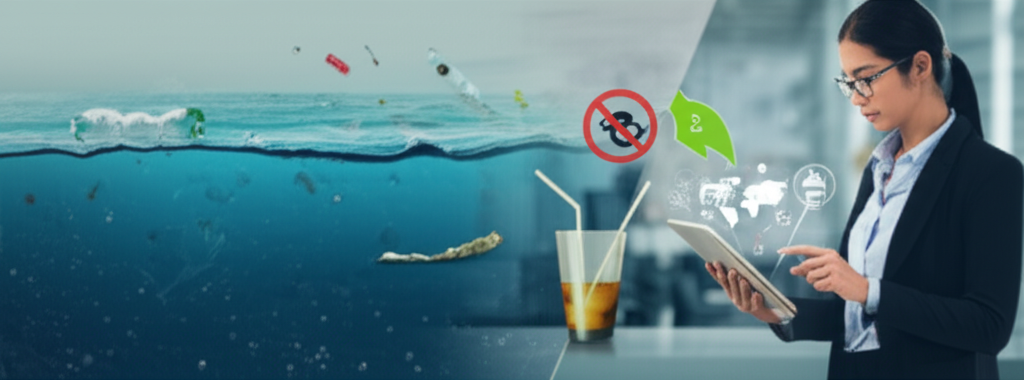The Strategic Shift: Why Recyclable Straws are Now a B2B Imperative
In an era defined by environmental urgency, the ubiquitous drinking straw has emerged as a significant flashpoint in the global battle against single-use plastic pollution. Businesses, from sprawling foodservice chains to boutique hospitality venues and major retailers, are facing an unprecedented imperative to re-evaluate their operational footprint. The escalating crisis of plastic waste, particularly its detrimental impact on marine ecosystems and landfill capacity, directly impacts corporate social responsibility and necessitates a profound shift towards genuine sustainability.
This isn’t just about public perception; it’s about compliance and future-proofing. Stringent regulations and sweeping plastic bans are rapidly reshaping the market landscape across major global economies. The European Union’s directive on single-use plastics, numerous US state-level prohibitions (like those in California and Seattle), and significant policy shifts in Asia, including China, are forcing B2B sectors to urgently seek viable alternatives. Decision-makers are grappling with a core challenge: how to navigate this evolving regulatory landscape, ensure seamless compliance, and simultaneously enhance brand reputation without disrupting the crucial customer experience or compromising operational efficiency. The pressure to transition is real, and the consequences of inaction, from significant fines to reputational damage, are growing.

Beyond the Hype: Unpacking the Complexities of Eco-Friendly Straw Choices
The initial rush to embrace “eco-friendly” straw solutions brought its own set of challenges. Early iterations of paper straws, while well-intentioned, often succumbed to sogginess within minutes, altered beverage taste, and lacked the durability necessary for a consistent customer experience. Similarly, first-generation bioplastic straws, primarily Polylactic Acid (PLA) derived from corn starch, gained traction for their plant-based origin but often led to significant operational pitfalls. Businesses quickly discovered that PLA requires specific industrial composting conditions (often high heat over 56°C) to break down, facilities for which are scarce. When disposed of in landfills or oceans, PLA acts much like conventional plastic, leading to valid “greenwashing” concerns and eroding consumer trust.
Further complicating the landscape, recent research has unveiled the presence of Per- and Polyfluorofluoroalkyl Substances (PFAS)—”forever chemicals”—in some paper straw formulations. These chemicals, added for water resistance, pose serious environmental and health risks, directly contradicting the very purpose of seeking sustainable alternatives. Moreover, the crucial accessibility debate cannot be overlooked. For individuals with disabilities or certain health conditions, the flexibility and durability of traditional plastic straws are essential for safe, independent drinking. Many “sustainable” alternatives, such as rigid metal or glass, pose significant injury risks, while paper or pasta straws can become choking hazards. Any viable B2B solution must address these critical safety and accessibility needs alongside environmental performance.

The Strategic Advantage: Embracing Next-Generation Sustainable Straw Solutions
The market has evolved, introducing innovative materials that address the shortcomings of earlier alternatives. The latest advancements in straw technology offer a strategic advantage, moving beyond mere compliance to genuine performance and environmental integrity. Innovative plant-based alternatives like Polyhydroxyalkanoates (PHA), derived from bacterial fermentation, sugarcane bagasse (a byproduct of sugar production), rice, and even seaweed, are now offering superior durability and performance across diverse beverage types. Crucially, these materials demonstrate genuine biodegradability in varied environments, including home composting and even marine settings, significantly mitigating concerns about greenwashing and microplastic pollution. For a deeper dive into sustainable packaging options, explore momoio.com/sustainable-packaging.
Comparative Analysis: Choosing the Right Recyclable Straw for Your Operation
| Type de paille | Key Material | B2B Durability (Hot/Cold) | True Biodegradability/Compostability | Typical B2B Cost/Unit | Key Advantages for B2B | Key Considerations for B2B |
|---|---|---|---|---|---|---|
| Traditional Paper | Virgin/Recycled Paper | Moderate (Cold Only) | Biodegradable (Landfill) | Faible | Widely Available, Recognizable | Prone to sogginess, potential PFAS, not truly compostable |
| PFAS-Free Paper | Virgin/Recycled Paper, Eco-coating | Improved (Hot/Cold) | Biodegradable (Landfill/Compostable) | Moyen | Addresses PFAS concerns, better durability | Still can soften, may require industrial composting, variable quality |
| PLA (Bioplastique) | Polylactic Acid (Corn Starch) | Good (Cold Only) | Compost industriel uniquement | Moyen | Looks/Feels like plastic, plant-based | Requires specific industrial composting, greenwashing risk in landfills |
| PHA (Advanced Bioplastic) | Polyhydroxyalkanoates (Bacteria) | Excellent (Hot/Cold) | Home Compostable, Marine-Degradable | Haut | Truly biodegradable, ocean-safe, durable | Higher initial cost, newer to market, supply chain developing |
| Bagasse de canne à sucre | Sugarcane Pulp | Good (Hot/Cold) | Home/Industrial Compostable | Moyen | Utilizes agricultural waste, sturdy, natural look | Texture may vary, can be brittle |
| Wheat Straw | Wheat Stalks (Gluten-free) | Moderate (Cold Only) | Home/Industrial Compostable | Faible | Natural byproduct, cost-effective, unique | Can be flimsy, limited hot beverage use, texture |
| Reusable (Steel/Glass) | Stainless Steel, Borosilicate Glass | Excellent (Hot/Cold) | N/A (Reusable) | High (per unit) | Zero waste, premium customer experience, long-term asset | Requires washing/sanitization, potential injury risk, customer adoption |
The embrace of these next-generation solutions positions early adopters for substantial competitive advantage. The global eco-friendly straw market is experiencing robust growth, projected to reach an impressive USD 25.1 billion by 2035, with the paper straw segment alone achieving a 15.6% CAGR by 2030 (Future Market Insights). This significant market expansion, driven by increasing consumer awareness and stringent regulations in key markets like North America and Europe, underscores the economic viability of sustainable choices.

Realizing Tangible ROI: Beyond Compliance to Competitive Differentiator
Strategic investment in advanced recyclable straws directly contributes to regulatory compliance, significantly mitigating the risks of escalating fines, legal challenges, and negative publicity associated with evolving plastic bans. This proactive approach ensures your operations are not just compliant, but ahead of the curve. Furthermore, this commitment translates into a profound positive impact on brand image and customer loyalty. Research consistently shows that a significant majority of consumers—up to 78%—prefer eco-friendly options. By visibly demonstrating a genuine commitment to sustainability, businesses can attract new, environmentally conscious clientele and strengthen existing relationships, transforming sustainability into a powerful differentiator.
Beyond immediate gains, there are tangible long-term operational savings. Reduced waste management costs, enhanced supply chain resilience through diversified material sourcing, and the avoidance of future regulatory penalties all contribute to a healthier bottom line. Investing in sustainable alternatives aligns with the growing trend of green dining and responsible consumption, positioning your brand as a leader rather than a follower. To optimize your supply chain for eco-friendly products, visitmomoio.com/supply-chain-optimization. This isn’t just about purchasing a product; it’s about a strategic investment that yields both environmental dividends and significant financial returns. Explore how sustainable choices impact your overall corporate social responsibility atmomoio.com/corporate-sustainability.
Future-Proofing Your Operations: Make an Informed Choice Today
For B2B leaders, the decision points are clear: balancing environmental responsibility, maintaining operational efficiency, ensuring superior customer experience, and securing long-term financial viability. The era of single-use plastic straws is rapidly fading, replaced by a nuanced landscape of sustainable alternatives. Selecting the right recyclable straw is not merely a procurement decision; it is a strategic investment that proactively aligns your business with emerging green dining trends and demonstrates a tangible commitment to a circular economy. The market’s shift, fueled by global regulatory pressures and a conscious consumer base, makes this an opportune moment for transformation.
Your business can be a part of the solution, not the problem. Ready to elevate your B2B sustainability profile and optimize your operations? Download our exclusive “B2B Green Procurement Guide for Sustainable Straws” for a comprehensive material deep dive and supplier checklist. Alternatively, schedule a personalized consultation with our sustainability experts to design a tailored solution that meets your enterprise’s unique needs, ensuring compliance, enhancing brand reputation, and securing long-term competitive advantage. Make the informed choice today.






